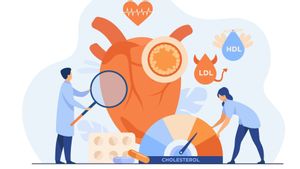JAKARTA - Menopaus and its effects on the body are increasingly being discussed lately. However, you may be surprised to learn that hormonal changes during this period of life can affect mouth health.
In fact, according to the 2023 Senior Mouth Health Survey and Menopause by Delta Dental. The majority of women aged 50 and over do not realize that menopause increases the risk of some mouth health problems.
The menopause period, which usually starts in the 40s or 50s, reproductive hormones such as estrogen decrease and can cause various symptoms of the mouth such as dry mouth, discomfort with the mouth, even pain and fire, said dentist Jessica Buehler, DDS, Senior Director of Dental Affairs in Delta Gigi, staggered from Livestrong, Monday, November 20.
Learn how menopause can affect your mouth health and get tips on how to better protect teeth and gums in the elderly.
Dry mouth is a fairly common symptoms of menopause, affecting 1 in 3 according to Delta Dental. saliva is the main "protector" of the mouth and has many functions, including preventing tooth damage, limiting the growth of bacteria in the mouth, helping digestion and helping clean food particles, according to the Mayo Clinic.
Although many people do not realize it, saliva production is related to estrogen levels. For most people, estrogen reduction can be seen from changes in production and consistency of saliva, based on research in 2022 in the International Journal of Environmental Research and Public Health.
Without normal saliva production, chronic dry mouth can cause various symptoms and over time endangers oral health. According to the Cleveland Clinic and Adriana Backer, DDS, a prosthodontist at the ClearChoice Dental Implant Center, a decrease in saliva production can lead to the following:
Menopaus can also affect bone growth and density. When estrogen levels decrease, the body can no longer grow or repair the bone at the same speed, causing bone loss.
The Cleveland Clinic estimates that about 20 percent of bone loss occurs in the first five years of menopause. Significantly, it increases the risk of fractures, low bone mineral density (BMD), and osteoporosis (a disease that weakens bones and lowers bone density.)
This rapid change can also affect your mouth, especially your jaw and tooth. Reviewing July-September 2014 at the "Journal of Mid-Life Health" citing several studies linking BMD's decline in jawbone and advanced osteoporosis with date teeth.
Menopaus affects bone density throughout the body, including jawbone, thereby reducing jaw support for teeth, says Dr. Buehler.
Estrogen change can also weaken the strength of the ligament, such as the ligament that holds teeth in its solids. So that dental movement can occur because the teeth 'floating' are not aligned.
Unparalleled teeth can cause problems when biting, says Dr. Buehler, which can cause teeth to pound, jaw aches, and headaches.
"It can also put less stress on the teeth, cause fractures, fractures, and even cause nerve death in those teeth," he added.
اقرأ أيضا:
Dental pain and verbal discomfort are often caused by fundamental problems, such as dry mouth and bone density problems, for example. However, menopause is also associated with a painful condition known as burning mouth syndrome, or BMS.
According to a 2013 July-September article in Anals of Medical & Health Sciences Research, BMS is a chronic condition that causes a moderate to severe sensation of burning or cutting the tongue, lips, or the interior of the mouth.
BMS is relatively rare, only in 2 percent of the population, but women are seven times more likely to be diagnosed than men. And most of the women who experience it are postmenopausal women, according to the American Academy of Oral Medicine (AAOM).
The exact cause of BMS is unknown, but Dr. Backer said the symptoms of the pain are thought to be related to the lack of estrogen, as this mostly attacks women during or after menopause.
AAOM noted that BMS is associated with mental health conditions such as anxiety and depression as well as fibromyalgia, and is related to other symptoms such as fatigue, shoulder pain, and concurrent ears.
BMS can cause other problems such as candialysis ( fungal infection), allergies, tongue problems, dry mouth, and other health problems that endanger a person's mouth health, "records Dr. Backer.
Menopaus and the accompanying changes do feel heavy, but there are several steps that can be taken to protect and even improve your mouth health. You can consult a dentist, regularly brush and clean your teeth with threads, and pay attention to the types of drugs you are taking if you have health problems.
The English, Chinese, Japanese, Arabic, and French versions are automatically generated by the AI. So there may still be inaccuracies in translating, please always see Indonesian as our main language. (system supported by DigitalSiber.id)


















